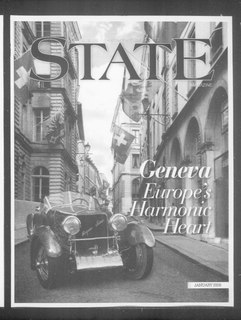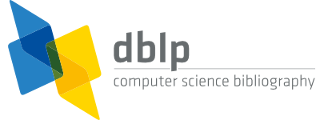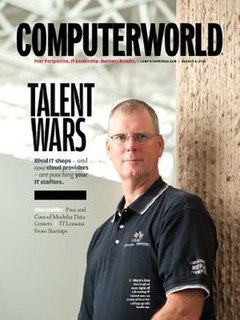iX is a German monthly computer magazine, published by the Heise Verlag publishing house since 1988. The magazine focuses primarily on professional IT. Within this area it deals with a broad range of issues, ranging from various programming topics, server hardware reviews and virtualization, computer security to articles about emerging technologies and current IT related legal or political issues. The magazine is headquartered in Hannover.
It has an older sister magazine, c't , which covers general computer technology.
The magazine had a sold circulation of about 51,000 (Q3/2008; printed circulation: 72,000).[ needs update ].

A magazine is a periodical publication which is printed in gloss-coated and matte paper. Magazines are generally published on a regular schedule and contain a variety of content. They are generally financed by advertising, by a purchase price, by prepaid subscriptions, or by a combination of the three.

c't – Magazin für Computertechnik is a German computer magazine, published by the Heinz Heise publishing house.

DBLP is a computer science bibliography website. Starting in 1993 at Universität Trier in Germany, it grew from a small collection of HTML files and became an organization hosting a database and logic programming bibliography site. Since November 2018, DBLP is a branch of Schloss Dagstuhl – Leibniz-Zentrum für Informatik (LZI). DBLP listed more than 5.4 million journal articles, conference papers, and other publications on computer science in December 2020, up from about 14,000 in 1995 and 3.66 million in July 2016. All important journals on computer science are tracked. Proceedings papers of many conferences are also tracked. It is mirrored at three sites across the Internet.

Heinz Heise is a publishing house based in Hanover, Germany. Its focus is PC-oriented publications such as c't, iX and heise.de, as well as corresponding online services published by its UK-based subsidiary Heise Media UK Ltd.

Popular Electronics was an American magazine published by John August Media, LLC, and hosted at TechnicaCuriosa.com. The magazine was started by Ziff-Davis Publishing Company in October 1954 for electronics hobbyists and experimenters. It soon became the "World's Largest-Selling Electronics Magazine". In April 1957 Ziff-Davis reported an average net paid circulation of 240,151 copies. Popular Electronics was published until October 1982 when, in November 1982, Ziff-Davis launched a successor magazine, Computers & Electronics. During its last year of publication by Ziff-Davis, Popular Electronics reported an average monthly circulation of 409,344 copies. The title was sold to Gernsback Publications, and their Hands-On Electronics magazine was renamed to Popular Electronics in February 1989, and published until December 1999. The Popular Electronics trademark was then acquired by John August Media, who revived the magazine, the digital edition of which is hosted at TechnicaCuriosa.com, along with sister titles, Mechanix Illustrated and Popular Astronomy.

The Geophysical Fluid Dynamics Laboratory (GFDL) is a laboratory in the National Oceanic and Atmospheric Administration (NOAA) Office of Oceanic and Atmospheric Research (OAR). The current director is Dr. Venkatachalam Ramaswamy. It is one of seven NOAA Research Laboratories (RLs).

Compute!, often stylized as COMPUTE!, was an American home computer magazine that was published from 1979 to 1994. Its origins can be traced to 1978 in Len Lindsay's PET Gazette, one of the first magazines for the Commodore PET computer. In its 1980s heyday Compute! covered all major platforms, and several single-platform spinoffs of the magazine were launched. The most successful of these was Compute!'s Gazette, which catered to VIC-20 and Commodore 64 computer users.

PC Format was a computer magazine published in the United Kingdom by Future plc, and licensed to other publishers in countries around the world. In publication between 1991 and 2015, it was part of Future plc's Format series of magazines that include articles about games, entertainment and how to get the most out of the platform. Despite the occasional mention of alternatives, PC Format takes the term 'PC' to mean a Microsoft Windows-based computer.

MIT Technology Review is a bimonthly magazine wholly owned by the Massachusetts Institute of Technology, and editorially independent of the university. It was founded in 1899 as The Technology Review, and was re-launched without "The" in its name on April 23, 1998 under then publisher R. Bruce Journey. In September 2005, it was changed, under its then editor-in-chief and publisher, Jason Pontin, to a form resembling the historical magazine.

PC Magazine is an American computer magazine published by Ziff Davis. A print edition was published from 1982 to January 2009. Publication of online editions started in late 1994 and continues to this day.

Computer Games Magazine was a monthly computer and console gaming print magazine, founded in October 1988 as the United Kingdom publication Games International. During its history, it was known variously as Strategy Plus and Computer Games Strategy Plus, but changed its name to Computer Games Magazine after its purchase by theGlobe.com. By April 2007, it held the record for the second-longest-running print magazine dedicated exclusively to computer games, behind Computer Gaming World. In 1998 and 2000, it was the United States' third-largest magazine in this field.

Computerworld is an ongoing decades old professional publication which in 2014 "went digital." Its audience is information technology (IT) and business technology professionals, and is available via a publication website and as a digital magazine.

IEEE Spectrum is a magazine edited by the Institute of Electrical and Electronics Engineers. The IEEE's description of it is:
IEEE Spectrum is the flagship magazine and website of the IEEE, the world’s largest professional organization devoted to engineering and the applied sciences. Our charter is to keep over 400,000 members informed about major trends and developments in technology, engineering, and science. Our blogs, podcasts, news and features stories, videos and interactive infographics engage our visitors with clear explanations about emerging concepts and developments with details they can't get elsewhere.

Computer Weekly is a digital magazine and website for IT professionals in the United Kingdom. It was formerly published as a weekly print magazine by Reed Business Information for over 45 years. Topics covered within the magazine include outsourcing, security, data centres, information management, cloud computing, and mobile computing to computer hacking and strategy for IT management.
Make is an American magazine published by Make: Community LLC which focuses on Do It Yourself (DIY) and/or Do It With Others (DIWO) projects involving computers, electronics, metalworking, robotics, woodworking and other disciplines. The magazine is marketed to people who enjoyed making things and features complex projects which can often be completed with cheap materials, including household items. Make is considered "a central organ of the maker movement".

Vojislav "Voja" Antonić is a Serbian inventor, journalist and writer. He is known for creating a build-it-yourself home computer Galaksija and originating a related "Build your own computer Galaksija" initiative with Dejan Ristanović. This initiative encouraged and enlightened thousands of computer enthusiasts during the 1980s in the Socialist Federal Republic of Yugoslavia. Antonić has donated many of his personal creations to the public domain. He was also a magazine editor and contributed to a number of radio shows.

Computeractive is a fortnightly computer magazine published by Future plc in the United Kingdom. It is the sister magazine to Web User.

Erik Möller is a German freelance journalist, software developer, author, and former deputy director of the Wikimedia Foundation (WMF), based in San Francisco. Möller additionally works as a web designer and previously managed his own web hosting service, myoo.de.

The Computer Paper was a monthly computer magazine that was published in Canada from February 1988 until November 2008. The magazine was originally published by Canada Computer Paper Inc. It was purchased in 1997 by Hebdo Mag International of Paris, France, and then to Piccolo Publishing Ltd of Toronto in 2003. Publication ceased in November 2008 due to declining ad revenues.

Byte was an American microcomputer magazine, influential in the late 1970s and throughout the 1980s because of its wide-ranging editorial coverage.